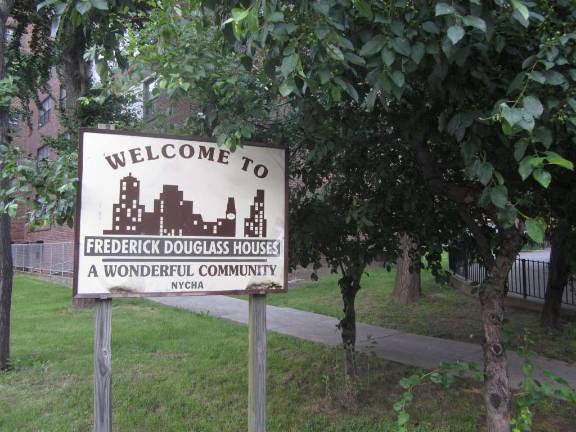Public Housing Outcry

Residents pose alternate solutions for NYCHA's $6 billion deficit
Wednesday at noon, hundreds of public housing advocates, flanked by City Council Members like Melissa Mark Viverito, gathered on the steps of City Hall to call for the end, or at least the delay of, public housing infill development, and a more transparent relationship between residents and the New York City Housing Authority. The cash-strapped New York City Housing Authority (NYCHA), which is $6 billion in debt, has entered the Uniform Land Use Review Process (ULURP) for building luxury housing projects on affordable housing campuses citywide, in order to stem their out-of-control debt. But many residents of low-income housing, including those from Frederick Douglass housing on West 107th Street, have been fighting back.
"They treat public residents as second class citizens," said Madelyn Innocent, a Frederick Douglass resident and Community Board 7 member. "How much is it going to take for NYCHA to actually listen to us? As a resident of Douglass housing, I've seen too much of NYCHA non-transparency. Plus they're wasting a lot of money and not putting their funds where it needs to be on repairs."
So how is NYCHA supposed to get out of debt without putting up unpopular high rises? Ideas have been laid out by Community Board 7, residents and NYCHA itself, but the issue is more complicated than at first glance. This past week, Community Board 7 voted strongly for two resolutions that would introduce a moratorium that would sufficiently delay any requests for proposal on infill development at Frederick Douglass. The board also overwhelmingly approved abandoning the infill development plans completely, and searching for different revenue sources for NYCHA.
"Plan NYCHA, the organization's plan for increasing revenue lists things like putting up cell phone towers, leasing space out to businesses, putting up billboards," said Nick Prigo, the chair of Housing on Community Board 7. "In other words, they do have other techniques to generate money. I'm supportive of these ideas, and I think people might be open to low rise commercial space."
But according to NYCHA, Plan NYCHA needs to take each of these strategies into account, including infill development, in order to dig themselves out of the hole, and improve upon already-existing housing. According to Sheila Stainback, a NYCHA spokesperson, Congress has been underfunding NYCHA by $750 million since 2001, and as a result housing has been falling into disrepair (Frederick Douglass houses alone would take $200 million just to keep up with the backlog of complaints).
"The alternative ideas suggested by Board 7 are still under active pursuit by NYCHA, or currently underway; but together, they are not capable of generating anywhere near the level of funding that the land lease initiative is capable of providing," said Stainback in a statement.
One of the other most common suggestions that was proposed by the City Council in a resolution was to take back the $73 million annually owed by NYCHA to the NYPD. According to a decades-old memorandum of understanding, NYCHA will annually owe $73 million for "special housing police services." In addition, according to Victor Bach, who directs Community Service Society (CSS) housing policy research and advocacy, NYCHA also pays $23 million in pilot payments in lieu of property taxes.
"If they can scare up enough capital to catch up with the 6 billion dollars, then they don't need to go into redevelopment. What's standing in their way? The politics of who controls those funds and why the city has to get $100 million a year from NYCHA," said Bach. "This is a long-term problem that merits a long-term solution. NYCHA should be working with the communities affected over the long-term to plan what's best for the community as a whole."
There have also been various other ideas out of this mess. Madelyn Innocent said that she has suggested reaching out to various celebrities who used to live in public housing, like Whoopi Goldberg and Jay-Z, for funds.
Bach said that Battery Park City has been under an agreement since the 1970s to give all excess revenues to affordable public housing, but the money has instead been going into the city's pocket. According to Scott Sieber, a representative from Comptroller Liu's office, these funds were actually designed to go toward The Housing Development Corporation and the Department of Housing Preservation and Development, not NYCHA.
Although the path to a solution remains unclear, residents have been fed up with the lack of transparency throughout the whole process.
"I am opposed to the infill plan because I believe that to do this for 20 percent affordable housing is not enough, and to take park and playground space away is wrong," said Julie Menin, a candidate for Manhattan Borough President. "There has not been any information or really any community outreach."
NYCHA has stated that they would give preference to developers who want to include more than just 20 percent affordable housing.